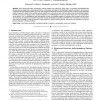Free Online Productivity Tools
i2Speak
i2Symbol
i2OCR
iTex2Img
iWeb2Print
iWeb2Shot
i2Type
iPdf2Split
iPdf2Merge
i2Bopomofo
i2Arabic
i2Style
i2Image
i2PDF
iLatex2Rtf
Sci2ools
106
click to vote
TVCG
2008
2008
Distributed Cognition as a Theoretical Framework for Information Visualization
Even though information visualization (InfoVis) research has matured in recent years, it is generally acknowledged that the field still lacks supporting, encompassing theories. In this paper, we argue that the distributed cognition framework can be used to substantiate the theoretical foundation of InfoVis. We highlight fundamental assumptions and theoretical constructs of the distributed cognition approach, based on the cognitive science literature and a real life scenario. We then discuss how the distributed cognition framework can have an impact on the research directions and methodologies we take as InfoVis researchers. Our contributions are as follows. First, we highlight the view that cognition is more an emergent property of interaction than a property of the human cond, we argue that a reductionist approach to study the abstract properties of isolated human minds may not be useful in informing InfoVis design. Finally we propose to make cognition an explicit research agenda, and...
Related Content
| Added | 16 Dec 2010 |
| Updated | 16 Dec 2010 |
| Type | Journal |
| Year | 2008 |
| Where | TVCG |
| Authors | Zhicheng Liu, Nancy J. Nersessian, John T. Stasko |
Comments (0)

